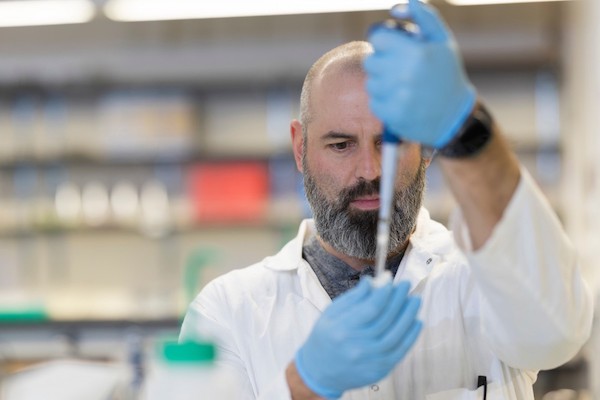Top 5 Binghamton Research Stories of 2024 (So Far)
Binghamton University is a hotbed for ground-breaking research—it’s no wonder we’ve earned the highest research ranking (R1) through the Carnegie Classification of Institutions of Higher Education. We just checked our stats for the first six months of the year, and here are the research stories you found the most fascinating—from developing technology to ID human remains to uncovering the secrets behind modern relationship lingo. Did you miss any of these headlines?
Ancient DNA technique aids in ID’ing burned bodies

A technique originally devised to extract DNA from woolly mammoths and other ancient archaeological specimens can be used to identify badly burned human remains, according to research from a team led by Binghamton’s Matthew Emery.
Fire victims may be identified through dental records, but often DNA testing is the only way to identify badly burned bodies. Researchers can extract usable DNA from bones subjected to conditions between 200 and 250 degrees centigrade; between 350 and 550 degrees, the team found a steep drop-off in the concentration of DNA. Their new technique – originally used to extract ancient DNA from Ice Age megafauna – allows for the amplification of shorter DNA fragments, which makes it useful in hotter fires.
“The whole point of the study is to devise a best practices approach for forensic anthropologists and forensic scientists working in the field,” Emery said.
A closer look at the experience of ego dissolution

Have you ever lost yourself in a good book or felt slightly unreal after a night of poor sleep?
Those are examples of a phenomenon known as ego dissolution, which can also be experienced through the use of psychedelic drugs. A team of researchers in the Psychology Department took a detailed look at what constitutes ego dissolution and they say questions remain about whether some people are naturally disposed to these states of consciousness. Many of us experience a mild version of ego dissolution in our day-to-day lives when we engage in “flow states.”
“Flow states arise when we are absorbed in an enjoyable and attention-engaging activity; think of reading a good book, completing an assignment you are immersed in or playing a sport you love,” doctoral candidate Fiona G. Sleight said. “In flow states, you become so absorbed in the task that you can lose track of time and feel less self-conscious.”
What’s actually in that bottle of tattoo ink?

When you get a tattoo, do you know what you’re putting under your skin? A Binghamton team found that the ingredient labels on tattoo ink often don’t match the actual substances in the bottle.
Researchers from the lab of Assistant Professor of Chemistry John Swierk analyzed tattoo inks from nine U.S. manufacturers and compared their actual contents with the label. Some 90% had major discrepancies with the labeled contents, such as different pigments than the ones listed or unlisted additives. More than half contained unlisted polyethylene glycol, which can cause organ damage through repeated exposure.
“We’re hoping the manufacturers take this as an opportunity to reevaluate their processes, and that artists and clients take this as an opportunity to push for better labeling and manufacturing,” Swierk said.
‘Study drugs’ set the stage for other drug use

Taking “study drugs” like Adderall without a diagnosis is not only dangerous; it can lead to other drug use and a decline in mental health. That’s the key finding by a team of Binghamton researchers led by Lina Begdache, associate professor of health and wellness studies. The researchers found several associations indicating that using one substance may lead to using others— as if the brain becomes primed for further substance use.
“Substance use promotes the release of the neurotransmitter dopamine, which is responsible for the initial euphoria and feelings of pleasure,” Begdache said. “These sensations act as a positive reinforcement for further substance use.”
What does ‘we’re just talking’ really mean?

When Melissa Hardesty and colleagues in Binghamton’s Human Sexualities Lab surveyed 403 undergraduates, they found that romantic relationships may be more important to college students than people tend to assume.
“In hookup culture, emotional attachments are taboo (though they do occur); ‘just talking’ allows students to form emotional intimacy while downplaying the significance of such intimacy – they’re just talking,” Hardesty said.
Stay up to date with the latest Binghamton research!
Rachel Coker, director of research advancement, will do just about anything to get people excited about research and scholarly work at Binghamton. Coker, who chairs the annual Research Days on campus, also edits online and print publications and writes about topics ranging from materials science to cinema.
Have questions, comments or concerns about the blog? Email us at social@binghamton.edu.
